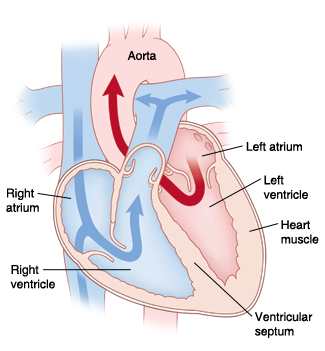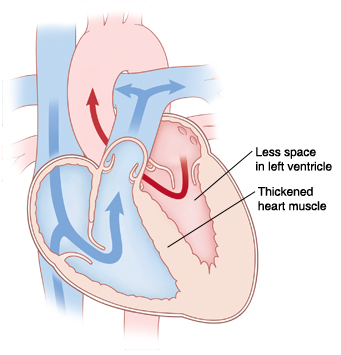When Your Child Has Hypertrophic Cardiomyopathy
Hypertrophic cardiomyopathy is a problem with the heart muscle. It may not cause symptoms that bother your child. But it can lead to serious problems over time. The good news is that it can usually be managed. Your child’s doctor will discuss treatment options with you. This sheet tells you more about this problem and how it is treated.
 |
 |
| The normal heart showing 4 chambers and four valves. |
With hypertrophic cardiomyopathy, the heart muscle thickens. |
The normal heart
The heart is divided into 4 chambers that hold blood as it moves through the heart. The 2 upper chambers are called atria. The 2 lower chambers are called ventricles. The heart also contains 4 valves between the chambers. The valves open and close to keep blood flowing forward through the heart.
What is hypertrophic cardiomyopathy?
With this condition, the heart muscle thickens. Heart muscle that is too thick can’t pump blood normally. It may affect the entire left ventricle. Or, it may just affect the wall that separates the ventricles (ventricular septum).
Why is hypertrophic cardiomyopathy a problem?
A thickened heart muscle can:
- Block blood flow leaving the heart. The thickened wall can block the outflow of blood or force the valve to close too soon due to changes in pressure. This forces the heart to work harder than normal to pump blood. If the heart no longer pumps blood well, a condition called congestive heart failure (CHF) can develop. In CHF, the inability of the heart to push blood forward appropriately can cause a backup of blood that will eventually overload the lungs and further weaken the heart muscle.
- Damage heart valves. The mitral valve is most likely to be affected. This valve is found between the left atrium and the left ventricle. Blood may leak backward through the valve. This is called valve insufficiency. Excess blood leakage through the valve puts undue strain on the ventricle so it has to pump extra hard to get all the blood out.
- Damage electrical cells in the heart. The thickened heart can change the way electricity is conducted through the heart and can affect the cells that control the beating of the heart. These cells control the beating of the heart. Damage to these cells can cause abnormal heart rhythms (arrhythmias). In rare cases, a severe arrhythmia can lead to sudden death.
What causes hypertrophic cardiomyopathy?
This condition can occur in your child by chance. A cause is not always identified. It can also be passed from parent to child in some families. If you or your child has this condition, each close family member should be tested for it. It is important to let your healthcare provider know if there is a history of sudden cardiac death in the family, or death at a young age.
What are the symptoms of hypertrophic cardiomyopathy?
Most children with this condition have no symptoms. If they do occur, they often show up when children are active. Symptoms may include:
- Lightheadedness, dizzy spells, or fainting
- Rapid, pounding heartbeat
- Shortness of breath or tiredness
- Tightness or pressure in the chest
How is hypertrophic cardiomyopathy diagnosed?
Heart problems in children are managed by a pediatric cardiologist. The doctor will do a physical exam. This is to check for heart problems. Several tests may be done. They can help confirm a diagnosis or tell more about the heart problem. These tests may include:
- Echocardiogram (echo). Sound waves (ultrasound) are used to create a picture of the heart. This helps find problems with heart structure or function.
- Electrocardiogram (ECG or EKG). This test records the electrical activity of the heart. It helps find arrhythmias or some problems with heart size or structure.
- Holter or event monitor. This test records the electrical activity of the heart over time. A special monitor is used. It can help detect problems with the heart rhythm.
- Exercise stress test. This records the electrical activity of the heart while your child exercises. It helps detect problems with the heart rhythm when the heart beats faster.
- MRI. This uses strong magnets and radio waves. A cardiac MRI scan can show problems with heart structure, abnormal blood flow, or tissue damage.
- Genetic Testing. This is to check for abnormal genes.
How is hypertrophic cardiomyopathy treated?
Treatment reduces symptoms. It helps prevent CHF. It can also reduce the risk of severe arrhythmia and sudden death. Your child’s treatment plan may include:
- Medicines. Beta-blockers and calcium channel blockers may be prescribed. These medicines can lower blood pressure and slow heart rate. They help to prevent arrhythmias. They may also improve the heart’s pumping action.
- Surgery. This is done in severe cases. Surgery removes a portion of the heart muscle. This improves blood flow from the heart to the body.
- Implantable cardioverter defibrillator (ICD). An ICD is a device that is placed in the chest. It tracks the heart rate. When needed, it delivers an electric shock to the heart. This stops a life-threatening heart rhythm.
- Heart transplant. In rare cases, a heart transplant may be needed. Your child’s cardiologist will discuss this with you.
What are the long-term concerns?
- With treatment, most children with this condition can be active. But they may have to limit certain sports or physical activities. Talk to the doctor about activities that are safe for your child.
- Your child needs to have regular visits with the cardiologist for the rest of his or her life. This is to check that the heart is working properly. If an ICD is placed, this needs regular checks.
- Your child may need to take medicine for the rest of his or her life.
|
When should I call my child's healthcare provider?
Contact your provider if your child has any of the following:
· Fainting or dizzy spells
· Trouble breathing
· Tightness or pain in the chest
· Irregular, rapid heartbeats (palpitations)
|